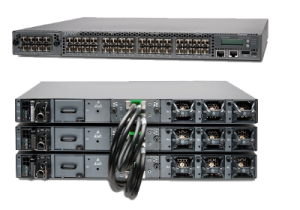Face to Face, Machine to Machine
The post Face to Face, Machine to Machine appeared first on 'net work.
The post Face to Face, Machine to Machine appeared first on 'net work.
 Big Tap 4.5, a next-generation network packet broker, is bringing security to Big Switch's monitoring.
Big Tap 4.5, a next-generation network packet broker, is bringing security to Big Switch's monitoring.

I came across some weird behavior (I think) in Junos recently. Nothing major, but an annoyance nonetheless.
Let’s check out some statistics on this beautiful looking EX4550 stack, shall we?
john@EX4550> show pfe statistics bridge
Slot 0
PFE: 0
----------------------------------------
---- Ingress Counters ----
-- Set0 --
Received: 654383803
VLAN Filtered: 0
Security Filtered: 0
Other Discards: 324
-- Set1 --
Received: 654383797
VLAN Filtered: 0
Security Filtered: 0
Other Discards: 324
[...]
Oh dear look, 324 “Other” discards on my EX4550. I sure hope they aren’t incrementing. Let’s issue the command again and check if the 324 figure has increased?
{master:0}
john@EX4550> show pfe statistics bridge
Slot 0
PFE: 0
----------------------------------------
---- Ingress Counters ----
-- Set0 --
Received: 913272
VLAN Filtered: 0
Security Filtered: 0
Other Discards: 0
-- Set1 --
Received: 913267
VLAN Filtered: 0
Security Filtered: 0
Other Discards: 0
[...]
No it hasn’t. In fact it has mysteriously reset itself along with all the other PFE statistics. That is, well, suboptimal to say the least.

It’s probably a known bug, though it’s not important enough for me to go look it up. Maybe it’s even intentional (though for the life of Continue reading
Original content from Roger's CCIE Blog Tracking the journey towards getting the ultimate Cisco Certification. The Routing & Switching Lab Exam
If you are a regular visitor to this site or a new one and have learnt anything from it and would like to give something back now is your chance. Please donate whatever you can to support me via the link below. https://www.justgiving.com/Roger-Perkin I will be doing a sponsored Abseil of the Spinnaker Tower in... [Read More]
Post taken from CCIE Blog
Original post Please Sponsor Me: Abseil the Spinnaker Tower
This post was written by Hadar Freehling, Security & Compliance Systems Engineer Specialist at VMware. The post originally appeared here on the dfudsecurity blog
***
There is a lot of power in having security controls in software. This is what I tell my customer, not just because I work for VMware. Why is that? The reason I find it so powerful is that I can now automate a lot of the security actions that use to be very manual. No more opening tickets to get a SPAN setup on the switch. No more waiting for a firewall change window to lock down a port. Not only that, I have visibility into the VM, like what apps are running and who started them, and what’s on the wire. I can protect different assets with different policies, and these polices can be dynamic.
With the help of my good friend John Dias (vRealize Orchestrator master), we created the follow video to show some of the potential of having everything in software.
Here is the scenario of the workflow. You are a security person and want to stop all server admins and users from launching a putty session once they have RDPed into a server Continue reading
Occasionally I’d invite a vendor speaker (usually working for an interesting startup) to present in my Data Center Fabrics webinar series. Dan Backman from Plexxi was talking about affinity networking in 2013, and in the May 2015 update session we’ll have Dinesh Dutt from Cumulus Networks talking about their software platform, architectures you can build with whitebox (or britebox) switches running Cumulus Linux, exciting network automation options, and cool new features they’re constantly adding to their software.